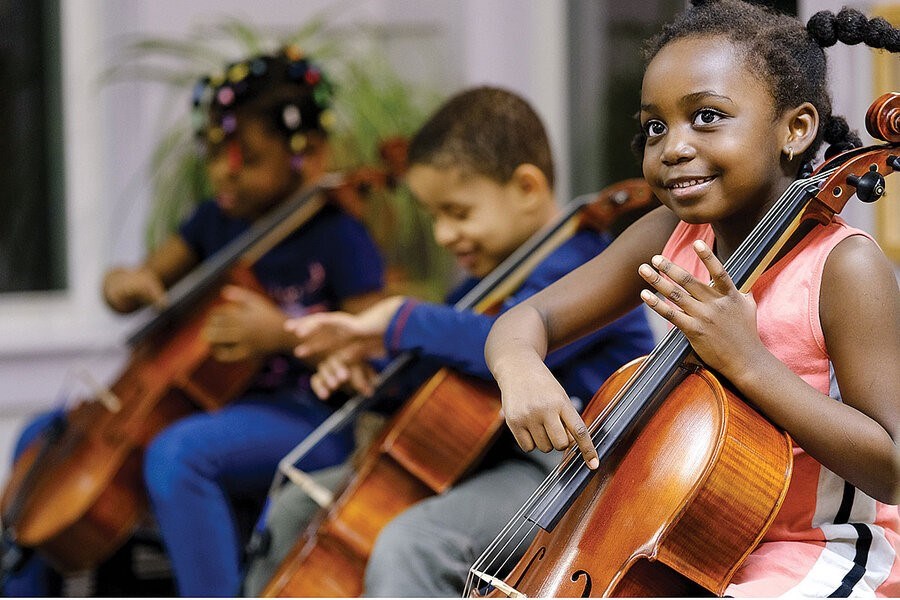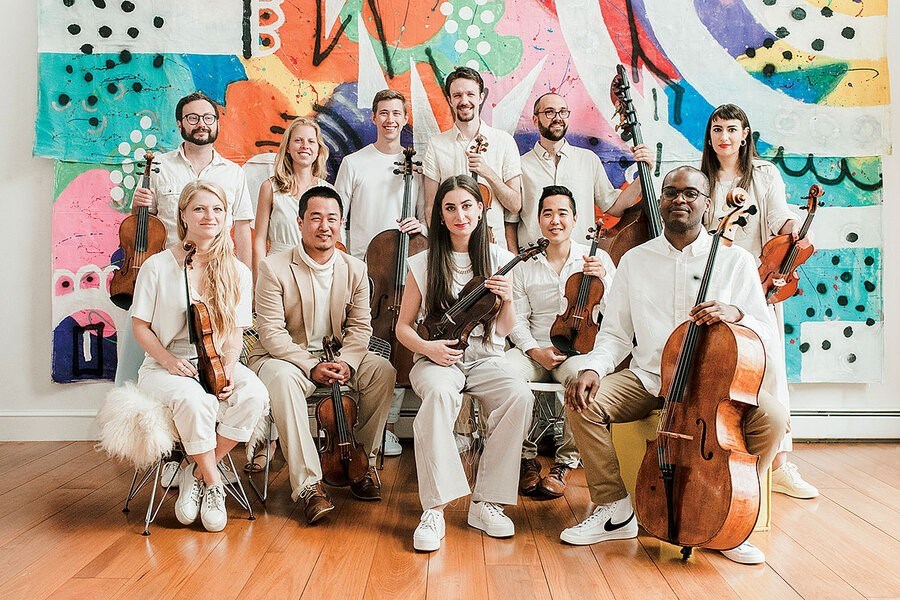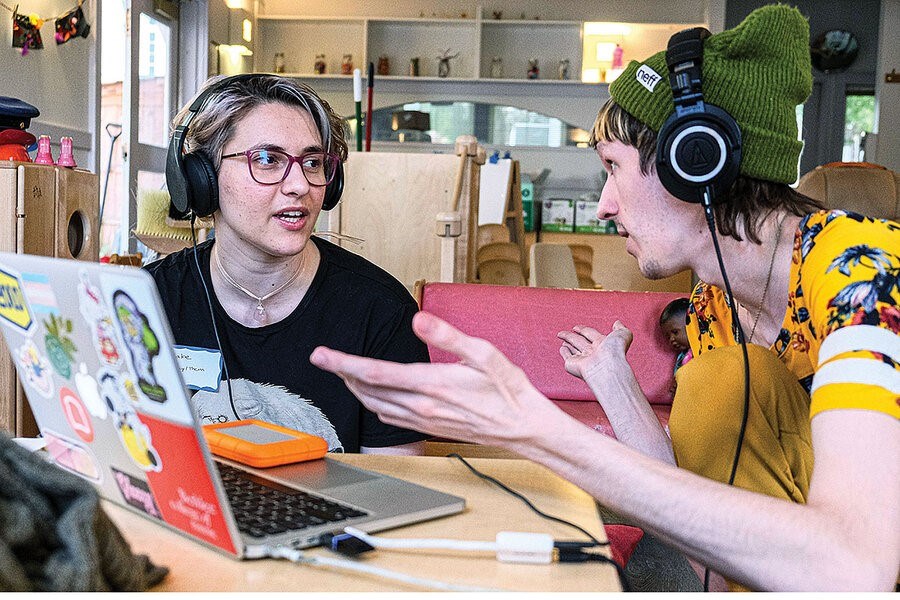REPRINTED WITH PERMISSION FROM THE CHRISTIAN SCIENCE MONITOR
 Kindergartners at The Opportunity Alliance’s Parkside Head Start program in South Portland, Maine, practice cello with Palaver Strings, January 2020. Feels Like Media/Courtesy of Palaver Strings
Kindergartners at The Opportunity Alliance’s Parkside Head Start program in South Portland, Maine, practice cello with Palaver Strings, January 2020. Feels Like Media/Courtesy of Palaver Strings
February 4, 2022
Caitlin Gillespie, an expecting mother putting a struggle with homelessness, excessive substance use, and incarceration behind her, was skeptical when a Boston Medical Center worker introduced her to the Lullaby Project in 2017.
The songwriting collaboration with the Palaver Strings ensemble guides new and expecting parents to craft original lullabies for their children. What, she wondered, could crafting a song with classically trained violinists and cellists from premier music schools do for her and her unborn child?
That question goes to the core of Palaver Strings’ mission. The musician-led string ensemble and nonprofit organization based in Portland, Maine, uses classical music to address social issues, ranging from racial justice to coral reef conservation. It engages with communities in concert halls, as well as in day cares and hospitals.
It turns out, Ms. Gillespie did have something to gain from the Lullaby Project. She worked with two Palaver Strings musicians to craft the lullaby “Harper Rose.” Named for her now 4-year-old daughter, the heartfelt melody paints the promise of a good life and endless support. But it wasn’t until after the birth, one night in the hospital, that Ms. Gillespie felt its impact as she played the lullaby for her daughter the first time.
“It was just me and her,” she says. “I had it on my phone, and I played it. The nurse came in, and I was crying. Playing that song ... it was a beautiful thing.”
That “beautiful thing” is Palaver’s medium for social change. Though classical music is historically associated with the elite, ensemble members shared a desire to break away from the traditional trajectory of classical musicianship that included cutthroat competition, rigid style, and run-of-the-mill performances for the upper-class audiences that could afford to attend.
“Classical music has many, many benefits,” says Mine Doğantan-Dack, editor and contributor of a forthcoming book, “The Chamber Musician in the Twenty-First Century.” “For audiences to witness [classical music], it’s a very emotionally positive thing.”
 Christina Wnek/Courtesy of Palaver StringsMembers of Palaver Strings sit last June before a mural they painted.Spirit of the “palaver hut”
Christina Wnek/Courtesy of Palaver StringsMembers of Palaver Strings sit last June before a mural they painted.Spirit of the “palaver hut”
Violinist Maya French and violist Brianna Fischler were students at Boston University when they started the ensemble in 2012.
“It was just a chance for our friends and colleagues that were in music school at that time ... to have more creative control of our artistic music-making, instead of just being in a school orchestra or a chamber group,” says Ms. French, now managing director of the group that includes 11 musicians.
Members share artistic and creative leadership in a model inspired by the “palaver hut” used in Liberia, a setting for discussion and conflict resolution. It was a concept Ms. French brought from a project she founded in high school to help Liberian youth.
By performing pieces from underrepresented composers, in urban auditoriums and rural community centers alike, Palaver commits to uplifting previously unheard voices and welcoming audiences that would otherwise have no invitation or inclination to engage with classical music.
The ensemble commissioned “Fear the Lamb,” a string orchestra piece by Akenya Seymour, a Black composer from Chicago. A recounting through music of the life and death of Emmett Till, a Black 14-year-old who was murdered in Mississippi in 1955 after being accused of whistling at a white woman, “Fear the Lamb” had a timely performance this fall, given the trials of Kyle Rittenhouse and defendants in the Ahmaud Arbery case.
The audience in the 30-seat Somerville, Massachusetts, room was gradually pulled into the boy’s journey of racial injustice. The graceful melody crescendoed into a harsh cacophony that dissipated into an eerie whistle. Then a sharp silence symbolizing the boy’s death brought the audience and musicians together, bowing heads and closing their eyes.
This, says cellist Matthew Smith, managing director of education, is how Palaver “uses music when words sometimes fall short.”
Palaver prioritizes community outreach, registering as a nonprofit in 2015 and leading yearly initiatives such as the Lifesongs Project. Heralded by Mr. Smith in partnership with both Boston’s Ethos and the LGBTQIA+ Aging Project, it creates space for LGBTQ adults to share their stories through song. Since 2017, it has helped create 17 original compositions.
Boston resident Stanley Sayer participated in 2019. A retired market researcher with a little performance experience, the nonagenarian collaborated with violist Lysander Jaffe and violinist Kiyoshi Hayashi. His song “There Will Always Be Roses” is about a young love of his in a time when homosexuality was taboo.
“At the beginning, I had trepidation. I didn’t know what on earth this was going to be about,” says Mr. Sayer, echoing Ms. Gillespie’s hesitancy. “Then they gave you hints about how to go about finding things. ... They made it so simple. It was really collaborative.”
Mr. Sayer hoped that messages of acceptance would reach the listeners, piercing through differences and tying together human values. Palaver advocates music as a vehicle for social change, says Elizabeth Moore, programming director and violist with Palaver Strings.
“I feel like music and the arts tap into a side of us that opens us up to empathy in a way that arguments and words and essays and articles often maybe don’t,” says Ms. Moore. “There might be a window there to reach somebody who wouldn’t otherwise agree with you by creating more of just a human connection.”
 Feels Like Media/Courtesy of Palaver StringsLake ƒrsek (in black shirt) composes their “life song” with the help of performer Toast.Creating new doors to music
Feels Like Media/Courtesy of Palaver StringsLake ƒrsek (in black shirt) composes their “life song” with the help of performer Toast.Creating new doors to music
But Palaver didn’t want that feeling to be limited to the glamorous stages. The idea for the Palaver Music Center came about when the ensemble found that some of their most meaningful performances happened in classrooms and day care centers.
The center opened in 2019 in Portland and works with over 325 students of all ages per year, offering accessible and affordable music lessons and workshops.
“We thought it would be important for us to create an organization where both those things are honored equally, the things being performance and education,” says Mr. Smith.
A feasibility study found that Portland, given its growing eastern and Central African immigrant and refugee population, would benefit from the Palaver Music Center.
“One of our moms recently told me how she didn’t have access to music when she was younger [growing up] in the Democratic Republic of Congo,” says Mr. Smith. “She was saying how when the opportunity came for her son, who’s in second grade now, she was just really thrilled ... that a program like this exists.”
Creating music and programming that centers human connection is a sentiment so universal that it can resonate through a sorrowful three-movement piece about the murder of Emmett Till, as well the bountiful spirit of childhood. At least, that’s what Heather Lee Rose’s experience suggests.
As 2020 Lullaby Project participants, Ms. Rose and her wife, Darcy Rose, crafted “Tender Little Things,” first singing it to their son Camden when he was 5 months old. Now a toddler, he requests the song: “Cam’s lullaby, please.”
Ms. Rose says, “I thought there’s no better gift I can give to our baby than actually creating a song with him in mind.”
Page created on 2/7/2022 2:52:23 PM
Last edited 2/7/2022 3:03:59 PM
